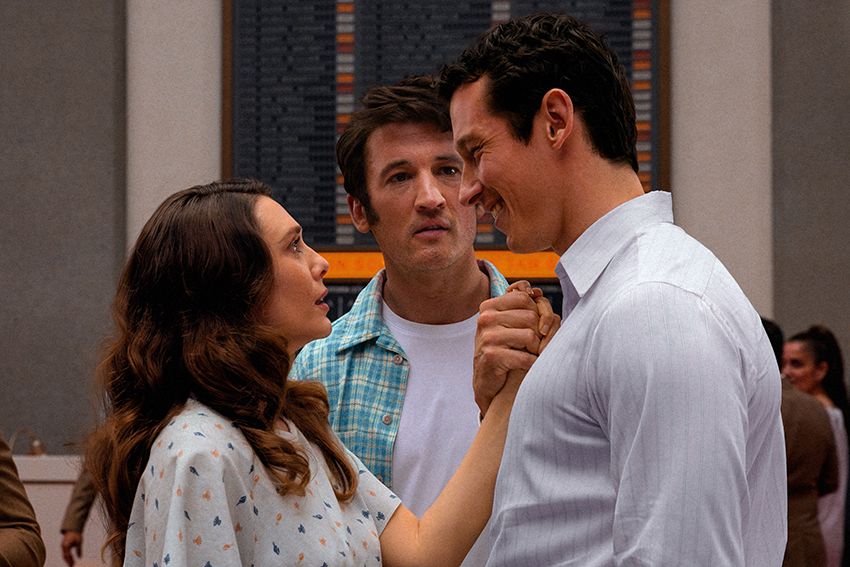A24’s film Eternity places you in a world that asks questions about life, love, and what lasts beyond death. Directed by David Freyne, the story follows Joan (Elizabeth Olsen), who arrives in the afterlife to discover she has one week to decide where to spend eternity. The choice is complicated: she must decide between her husband Larry (Miles Teller), with whom she shared a lifetime, and her first love Luke (Callum Turner), who died young and has waited decades for her arrival.
The film is framed as a romantic comedy, but the cast repeatedly returns to the deeper meaning at its heart: what does love look like when time is stripped away, and how do you measure faithfulness when eternity is at stake?
In looking through the film’s production notes it’s clear that Elizabeth Olsen was struck by the spiritual weight of Joan’s decision. “This is not your ordinary love triangle, because Joan has to make a decision about love outside all the normal framing of earthly time and circumstances,” she said. “Her decision is truly about forever this time, and I was so drawn to that dilemma”.
That word—forever—signals the film’s central concern. For Olsen, the story presses you to consider how commitments are lived out when no end point exists. It’s a meditation on promise and loyalty, the same values that underpin religious visions of marriage and eternal union.
For Miles Teller, the project touched something familiar in his own family. In preparing to play Larry, he thought of his grandparents, who have been married more than sixty years. “I thought a lot about their relationship,” Teller explained. “My grandfather was always willing to sacrifice for his wife, which is something beautiful that Larry shares”.
Larry is not a heroic figure in the usual sense. He is a suburban father whose life was dedicated to caring for his wife and children. Teller found faith in this ordinary devotion: “Before he passes, Larry is just an ordinary family guy who loves Joan, but that’s what I appreciated about him. His entire life was about working hard to make her and his kids happy; even in the afterlife, that’s still the only thing that motivates him”.
The performance highlights a form of faith often overlooked—the quiet trust that grows in long marriages, the kind that perseveres through disappointment and routine. For Teller, that perseverance is itself an act of love that carries into eternity.
Luke, Joan’s first love, represents another form of faith: waiting. For sixty-seven years in the film’s timeline, Luke has remained in the Junction, the bustling afterlife hub, refusing to move forward without Joan. Callum Turner described the burden of that choice: “When he first arrived at the Junction after dying in the Korean War, I think Luke hoped Joan might show up sooner rather than later. But a year turned into two and two turned to four and on and on until 67 years have passed. All this time he’s felt trapped by his longing for someone he never fully got to know”.
Turner’s comments point to the tension between devotion and stagnation. Luke’s faithfulness is pure, but it raises questions: is waiting for an idealized love an act of hope, or a refusal to accept change? For audiences, that question is left unresolved, echoing the way faith can both sustain and confine.
At its core, Eternity treats the afterlife as a marketplace, full of competing visions of happiness. Yet the film keeps pulling you back to one central decision: with whom will you spend forever? Director David Freyne explained that for Joan, “however daunting the choice, there truly is no right or wrong. There is no good guy or bad guy. I love the idea of the audience arguing over whether she made the right choice or not”.
The theological resonance is clear. Faith is not presented as doctrine or ritual, but as commitment. Choosing eternity with one person becomes an image of how you place your trust and what you believe will sustain you beyond time.
Olsen and Teller’s reflections show that Eternity is more than a romantic comedy set in the afterlife. It is a story about how faith is lived in relationships—through sacrifice, through waiting, through decisions that bind you to another. As Olsen put it, Joan’s story is about “love outside all the normal framing of earthly time.”
You may walk into the theatre expecting humour and spectacle. But you may also find yourself asking the same question the film leaves hanging: what does it mean to choose forever, and where would your faith carry you if given the chance?
ETERNITY releases in Australian cinemas December 4.
Photo supplied by A24





